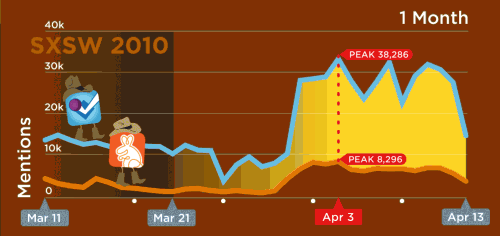We Are Social's Monday Mashup #23
Facebook unveils Open Graph protocol
At last week’s f8 developer’s conference, Facebook unveiled the next stage of their platform’s evolution, the Open Graph protocol. Described as “Web 3.0”, “winning the Internet”, “advancing the semantic web” or “a great crusade of colonization” depending on which pundit you’ve been reading.
As Stefano detailed so well here last week, the Open Graph effectively extends Facebook to any page on the web. Up until now external tools on a website typically extended to social bookmarking or sharing via services like Buzz, but by accessing Facebook’s vast collection of social interaction data, you can find out who else in your friend group likes the site, and what else they read and like on the site, thus turning Facebook into a mediator of information all over the web.
Already we’re seeing interesting implementations of the protocol come up, such as likebutton.me – a site that tracks what your friends have been liking on popular sites such as YouTube, CNN and Techcrunch. And we wouldn’t want We Are Social’s fans to miss out on the action either – which is why you can now find Facebook like buttons on the bottom of all our posts (including this one).
Every time Facebook releases a new feature there is an inevitable privacy backlash, usually the domain of a few choice experts, but it’s interesting to note that this is extending into the wider Facebook audience as well. A survey out today details how Facebook users are increasingly aware of the privacy implications of the site, with 77% (of an admittedly small sample) having used the site’s privacy tools to customise their privacy options. Could the new Open Graph become hamstrung as more users become privacy aware and opt-out?
It’s not just Facebook
While Facebook makes it all about conquering the web, location-based services are having a flying start in conquering meatspace. This week saw Foursquare hit a million users just over a year since it launched (even Arnold Schwarzenegger is on it). It took Twitter two years to do the same, and as sure as night follows day, this has meant Foursquare becoming the latest startup to be christened “the new Twitter” (seriously guys, can we get this decided once and for all, so the rest of us can get back to enjoying ourselves?).
Pointless analogies aside, the growth of Foursquare and its competitor Gowalla come under more and more scrutiny. This infographic from Mashable shows an interesting trend – Foursquare has far outpaced Gowalla in the popularity stakes since SXSW in terms of mentions, but the feedback on Gowalla is more positive and less negative. As the two continue to slug it out we could be witnessing one of the best case studies possible in whether sheer numbers or member affection is key to a vibrant and profitable social network.
Blogging – for the young and self-expressive
With all the talk of Web 3.0 it can be easy to dismiss blogging as “so 2004”. Yet new research from eMarketer show that the biggest age group amongst those who blog is 18-25; 40.4% of those who write a blog compared to 28.1% from the much larger 26-42 age group. More tellingly, the reasons given were primarily for self-expression rather than making money:
Bloggers of all ages polled by BlogHer and iVillage overwhelmingly blogged for pleasure, with self-expression the No. 1 reason, followed by “fun.” One-half of bloggers wanted to give advice, and fewer than one-third hoped to earn money with their efforts.
A lesson there for anybody wishing to engage with bloggers – understand what drives them to write and engage with their topic rather than consider them as the same as paid-for writers.
#socialmediasfault
As the election campaign in the UK grinds on, the past week saw an interesting divergence in how old and social media have been treating the leaders. After what most commentators have regarded as a strong performance in the new TV debates, the Liberal Democrat leader Nick Clegg has been heavily criticised in the mainstream press – so much so even Conservative bloggers such as Iain Dale voiced their concern. Twitter had different ideas, though. The hashtag, #nickcleggsfault, coined off-handedly by Justin McKeating, spread like wildfire as Twitterers all over the UK came up with ever-more sarcastic and nonsensical things to “blame” on Nick Clegg as a parody of the media backlash. While it’s clear this election won’t just be won on social media, it’s a clear sign of the disconnect between the traditional and new media – and this is an issue that will last long beyond the election.
